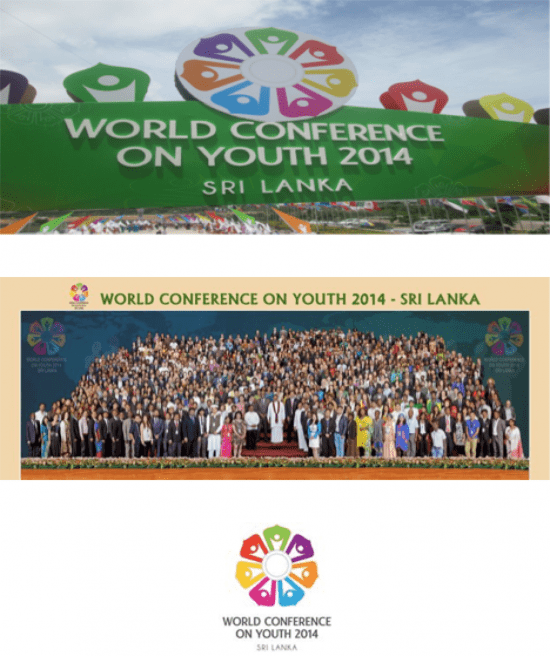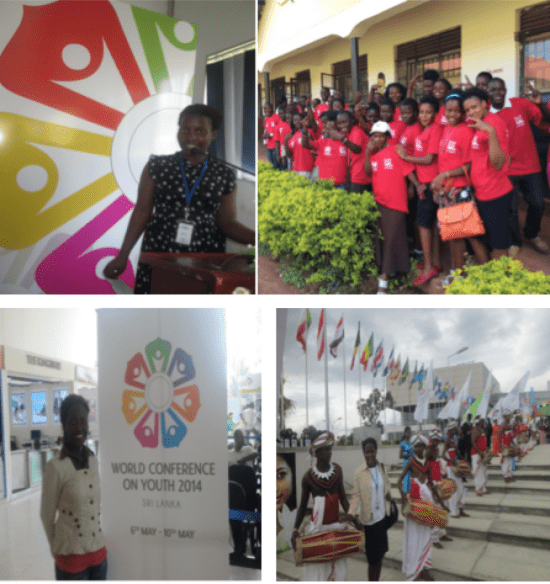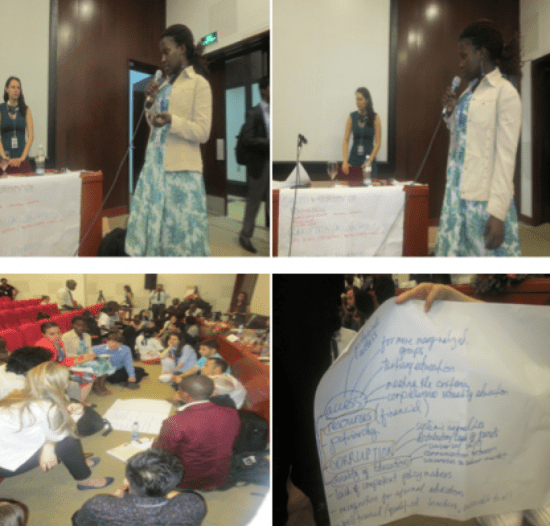UYDEL had the privilege of sending one representative to the World Conference on Youth, 2014, in Colombo, Sri Lanka. What we worked on there was mainstreaming youth in the post-2015 development agenda.
Introduction
The World Conference on Youth 2014 took place in Colombo, Sri Lanka. It involved a multitude of discussions ranging from: Achieving Good Governance and Accountability, Inclusive Youth Participation at All Levels, Youth Rights, Globalization/ Inclusive Youth-Led Development, Ending Systemic Inequalities, Gender Equality, and Empowering Marginalized Youth Including Most at Risk Young People.
Coupled to the above, many themes and side events were facilitated which included: Realizing Equal Access To Quality Education, Full Employment and Entrepreneurship, Poverty Eradication and Food Security, Promoting Healthy Lives and Access To Health, Environmental Sustainability, Disaster Risk Reduction and Youth Centered Urbanization, Realizing Peace, Reconciliation and Ending Violence.
POST 2015 Development Agenda
– Ensuring youth participation at all levels
– Equal access to information
– Engagement of the youth and facilitating youth voices to be heard at all levels
– Equal and quality education for all youth
– Putting to an end of youth unemployment through provision of vocational skills
– UN creation of the UN Volunteers club for Youth, promoting and encouraging youth voices to be heard.
– Facilitate youth involvement in the World through the Youth Action Plan (UN). Recognition of the youth and there active participation through supporting the youth agenda.
ROUND TABLE DISCUSSION 1: EMPOWERING MARGINALISED YOUTHS INCLUDING MOST AT RISK YOUNG PEOPLE
United Nations defines ‘Youth’ as individuals between the ages of 15 and 24 years. However different countries define youths as individuals in various diverse age groups, depending on different conditions that reflect a broader range of changes and development needs, before the transition to adult hood. In the Ugandan context particularly Uganda Youth Development Link (UYDEL), ‘youths’ are defined as young people falling between the age group of 10 and 24 years.
In this session our representative from UYDEL Sarah Deborah Nakirijja presented our work to protect and support Marginalized youths from various backgrounds in Uganda but in the broader perspective, it includes street slum youths, out of school, people living with HIV/AIDS, truck or boda riders, Youths with disabilities among others. These most at risk young people are exposed to so many hardships due to their status in society.
At UYDEL, vocational skills training seek to provide alternatives to potential and actual victims of Commercial Sex Exploitation of Children (CSEC) and other vulnerable children, to equip children with livelihood and survival skills and provide safe alternative means of earning that does not expose them to risky behavior (Rogers Kasirye et al, 2005).
Young People reached with vocational Skills in UYDEL since 2007
| Year | Male | Female | Not Disaggregated | Total |
| 2007 | 67 | 193 | – | 260 |
| 2008 | – | – | 568 | 568 |
| 2009 | – | 170 | 644 | 814 |
| 2010 | 291 | 581 | 181 | 1053 |
| 2011 | 308 | 919 | – | 1227 |
| 2012 | 89 | 610 | – | 699 |
| Total | 755 | 2473 | 1393 | 4621 |
ROUND TABLE DISCUSSION 2: GENDER EQUALITY WCY 2014
Gender is not so much about biological differences between men and women, but it is the social differentiation of women and men through processes which are learned, changeable over time and vary within and between cultures. At the economic level, gender appears as a sexual division of labor in which some types of work are strongly associated with women and some types with men. Ensuring gender equality matters in many ways to the development process of a country. Gender equality matters in its own right and has been recognized as ‘smart economics’. Experiences from various countries confirm that gender equality enhances economic efficiency and improves other development outcomes.
What should be done?
Sarah, our UYDEL representative noted that we need to do the following to address gender issues:
– Mainstreaming gender equality in all sectors of development.
– Gender equality relevant to energy, education, health, environment etc.
– Full employment of women and men.
– It’s a positive aspect for all women in policy making.
– Discrimination in the labor market affects development.
– Peace and reconciliation through inclusion of women as the most at risk plus children.
– Sexual Gender Based Violence (SGBV) to be eliminated.
– Quality education system, gender sensitive of women rights.
– CSO roles in the achievement of gender equality.
Is gender inequality an issue? Are women disadvantaged?
– 70% of the population below the poverty line is women.
– 2/3 of women population is illiterate.
– Advance education was a choice for girls in Uganda.
– Women playing the role in family support.
– Woman participation has been traditionally limited to a few areas eg teaching.
– Discriminatory social norms and perceptions.
– Security concerns-unsafe accommodation for females.
Current trends
– Diversity in doing business today.
– Women’s rights group advocacy.
– Vast variety of fields for male and females.
– Legislative and legal participation of women at all levels.
– Leadership positions for the youth male and female.
ROUND TABLE DISCUSSION 3: HEALTH AND HEALTH RIGHTS
Our UYDEL representative Sarah participated in the above discussions which mainly focused on alcohol and substance use among the youth, which affect young people.
The round table noted that, Health is an input and foundation for human development, as well as the economic development of a country. Smoking and alcohol use among youth is significant and needs careful attention, usually the first use of a cigarette, or use of alcohol takes place during adolescence. These substances greatly impair mental abilities and the physical skills of youth and enhance the long run risk of developing cancers, lung diseases, ulcers, heart diseases and liver diseases. In addition to the above, accidents is more common, violence, sexual abuse due to the effects of drug use.
There was a general agreement that alcohol is harmful and programs geared towards addressing alcohol need to be expanded. Youths need guidance, employment and education opportunities as coping mechanisms to help them fight the vice of alcohol and substance use.
Lessons Learnt and how they would be of help to UYDEL activities
– Getting sustainable solutions to youth problems, socially, economically and in terms of health rights.
– Access to Health and Education for economic development.
– Meet the challenges of the MDGS…that is to say inclusion of youth goals in the MDGs.
– Run projects to end youth unemployment.
– Important for youths to take action to end youth unemployment (to take our world).
– Young people with disabilities and others minorities to be included in the MDG agenda.
Conclusion
There’s need for youth participation at all levels of the development process. It was a good learning experience and am ready to share experiences with the youths back home, especially from the round table discussions.



